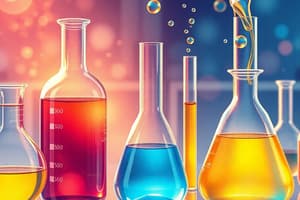Podcast
Questions and Answers
What is one of the main goals of analytical chemistry?
What is one of the main goals of analytical chemistry?
- Measuring the pH of different solutions
- Quantifying chemical compounds in environmental samples (correct)
- Identifying specific diseases in medical samples
- Separating isotopes in radioactive substances
What does qualitative analysis in analytical chemistry reveal?
What does qualitative analysis in analytical chemistry reveal?
- The chemical composition of complex mixtures in a sample
- The identity of the elements and compounds in a sample (correct)
- The separation techniques used in a sample
- The amount of each substance in a sample
In which fields are quantitative analytical measurements important?
In which fields are quantitative analytical measurements important?
- Chemistry, biochemistry, and physics (correct)
- Computer science and technology
- Anthropology and archaeology
- Zoology and botany
What is a fundamental step in analytical chemistry?
What is a fundamental step in analytical chemistry?
What role does analytical chemistry play in the food and beverage industry?
What role does analytical chemistry play in the food and beverage industry?
What is the purpose of using techniques like chromatography and spectroscopy in food analysis?
What is the purpose of using techniques like chromatography and spectroscopy in food analysis?
Which industry uses analytical chemistry for quality control to ensure that products meet specific standards?
Which industry uses analytical chemistry for quality control to ensure that products meet specific standards?
What is the primary purpose of using mass spectrometry in analytical chemistry?
What is the primary purpose of using mass spectrometry in analytical chemistry?
What is the purpose of repeating multiple trials in an experiment?
What is the purpose of repeating multiple trials in an experiment?
Which method involves determining the mass of the analyte or a chemically related compound?
Which method involves determining the mass of the analyte or a chemically related compound?
What does volumetric analysis primarily rely on for measurement?
What does volumetric analysis primarily rely on for measurement?
Which method in quantitative analysis involves the measurement of electrical properties such as voltage and current?
Which method in quantitative analysis involves the measurement of electrical properties such as voltage and current?
What is the primary focus of spectroscopic methods in analytical chemistry?
What is the primary focus of spectroscopic methods in analytical chemistry?
Which type of method involves measurements based on the production or interaction of electromagnetic radiation with analyte atoms or molecules?
Which type of method involves measurements based on the production or interaction of electromagnetic radiation with analyte atoms or molecules?
What is the primary focus of classical methods in analytical chemistry?
What is the primary focus of classical methods in analytical chemistry?
What is the difference between accuracy and precision in measurements?
What is the difference between accuracy and precision in measurements?
Flashcards are hidden until you start studying
Study Notes
Goals and Functions of Analytical Chemistry
- One main goal is to analyze the composition of materials to identify and quantify various substances.
- Qualitative analysis reveals the presence or absence of specific compounds within a sample.
Applications and Importance of Quantitative Analysis
- Quantitative analytical measurements are crucial in pharmaceuticals, environmental monitoring, clinical diagnostics, and quality control industries.
- A fundamental step in analytical chemistry involves sample preparation, which is vital for achieving accurate results.
Role in Food and Beverage Industry
- Analytical chemistry ensures food safety, quality, and compliance with regulations, affecting ingredients, additives, and nutritional content analysis.
- Techniques like chromatography and spectroscopy are used in food analysis to separate, identify, and quantify components, ensuring product integrity.
Quality Control and Mass Spectrometry
- Various industries, including pharmaceuticals and manufacturing, utilize analytical chemistry for quality control to ensure products meet industry standards.
- Mass spectrometry primarily serves to determine molecular weights and structural information of compounds.
Experimental Practices and Measurement Techniques
- Repeating multiple trials in an experiment enhances reliability and validity of results, minimizing errors and improving confidence.
- Gravimetric analysis determines the mass of the analyte or a chemically related compound, providing precise quantitative data.
Measurement Techniques in Quantitative Analysis
- Volumetric analysis relies on measuring liquid volumes to determine concentrations of solutions through titration methods.
- Conductometric analysis is a quantitative method that involves measuring electrical properties such as voltage and current to assess ionic concentration.
Spectroscopic Methods and Classical Techniques
- Spectroscopic methods primarily focus on the interaction between electromagnetic radiation and matter to identify and quantify substances.
- Classical methods in analytical chemistry emphasize techniques based on fundamental chemical principles, such as titrations and colorimetry.
Accuracy vs. Precision
- Accuracy refers to how closely a measured value aligns with the true value, while precision indicates the reproducibility of measurements under the same conditions.
Studying That Suits You
Use AI to generate personalized quizzes and flashcards to suit your learning preferences.




